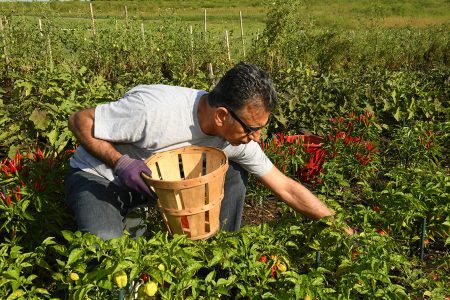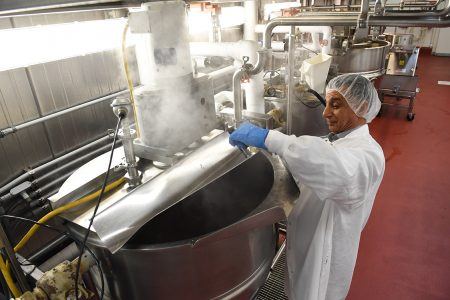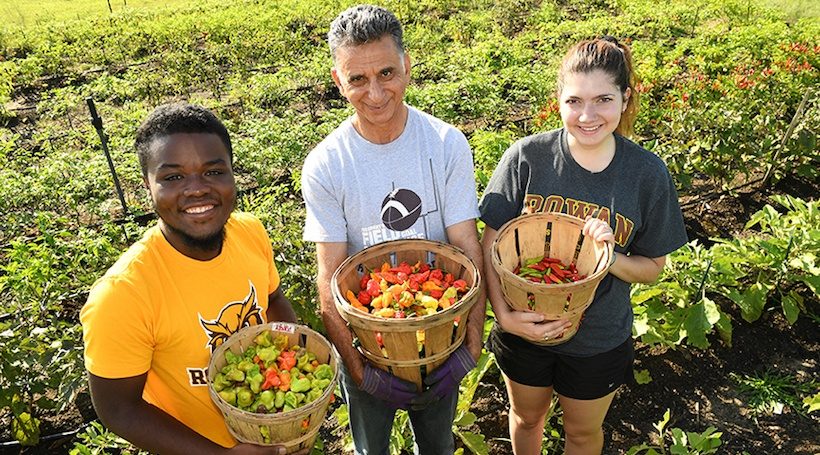Going for a run and eating hot sauce are a lot alike – at least that’s what Rowan University President Dr. Ali Houshmand says. And although you may not believe him at first, he makes a good case.
“Initially, when you start running, it’s burdensome and it hurts,” Houshmand says. “But once you become a runner and get to that high, it’s the most amazing experience. Hot sauce is the same thing.”
Houshmand clearly knows his spicy stuff, considering that his name – and an image of his face with steam coming out of his ears – are now plastered on an entire line of sauces called Houshmand’s Hazardous Hot Sauce.
There’s a mild flavor called Ali’s Nasty, a medium called Nastylicious (inspired by that mix of euphoria and struggle) and a hotter-than-you’d-expect flavor called Nastyvicious made from a secret recipe using peppers that Houshmand harvests by hand. Ingredients include everything from run-of-the-mill jalapeño and long hot peppers to exotic varieties like Scorpion Moruga and 7 Pot Primo.
Houshmand first started making his hot sauces as a fun hobby, thanks to his backyard garden, love of cooking and high-pressure job.
“It’s an intense environment, and there are times when one’s brain needs to think about simpler things,” says Houshmand. “So running and gardening have been two ways for me to deal with the tension of the work and create new ideas.”
 A few years ago, Houshmand’s harvest had a few too many peppers, so he decided to put the excess to use and created his first batch of hot sauce. (His impressive pepper yield might have something to do with him getting up before sunrise to tend to his plants and play music for them.) His homemade hot sauces became a favorite among friends and family, who for years happily received jars of his secret sauce as gifts.
A few years ago, Houshmand’s harvest had a few too many peppers, so he decided to put the excess to use and created his first batch of hot sauce. (His impressive pepper yield might have something to do with him getting up before sunrise to tend to his plants and play music for them.) His homemade hot sauces became a favorite among friends and family, who for years happily received jars of his secret sauce as gifts.
Houshmand’s hobby took an unexpected turn when his staff asked to auction off a few jars at a university event. The sauces’ popularity took off, and a successful project that combines Houshmand’s passion for hot sauce and affordable education was born.
“It is more than just food,” he says. “It’s something very unique. Sometimes people get confused and think I am not doing my job, but we are very much focused on our job – and this is a very big part of it. It’s not all about being intellectual and sitting in an office and reading complex papers, having complex discussions with sophisticated people. It’s about the lives of these kids.”
That’s why every dollar earned by sales of the sauce goes to the Rowan University Student Scholarship Fund, which helps students in need continue to afford their education. The system is simple: Buy a jar, support a student. Even just a few jars can be the difference between finishing a degree on time and dropping out, says Houshmand.
“It’s that $1,000, $2,000, $3,000 here and there for those kids in situations where they might not be able to continue. You can completely change the life of a student by just giving them $1,000.”
While hot sauce isn’t the most conventional approach to funding student aid, Houshmand has thrown himself into the project – and received an interesting hot sauce education along the way.
“It was very eye-opening for me to see what it takes to launch a product in this country,” Houshmand says. “It requires a great amount of thoughtfulness as well as expertise.”
There was a steep learning curve, so Houshmand and his team at Rowan relied on industry experts to guide them from harvest to delivery. First, the hot sauce recipe was sent to Cornell University’s Food and Brand Lab for approval from the FDA (that’s where they also learned more vinegar was needed to make the hot sauce last on the shelves).
Then, a trip to Rutgers University Food Innovation Lab helped the team transition from small-batch production to large-batch production. That required learning everything from how many times to grind the peppers and what shape of jar would be best for packaging to even what color of peppers would make the sauce an attractive color.
Rowan students have also been getting in on the action. One group has helped Houshmand harvest his peppers at the campus’ South Jersey Technology Park, and the resulting hot sauce has become the focus of several spicy events on campus.
 First came Wing Wars, where Houshmand introduced his sauce to students during the university’s annual wing-eating contest. Then came the cook-off, a celebration of National Hot Sauce Day. Faculty, students and alumni created their own dishes using one of the Houshmand’s Hazardous sauces to compete for the best in show title. (In case you were wondering, Rowan track and field coach Derick “Ringo” Adamson took place for his Ringo’s Island Surf & Turf, a dish that paired hot sauce-marinated N.Y. strip steak and fresh salmon with mango salsa, avocado and saffron rice, served in an authentic coconut cup imported from Adamson’s native Jamaica.)
First came Wing Wars, where Houshmand introduced his sauce to students during the university’s annual wing-eating contest. Then came the cook-off, a celebration of National Hot Sauce Day. Faculty, students and alumni created their own dishes using one of the Houshmand’s Hazardous sauces to compete for the best in show title. (In case you were wondering, Rowan track and field coach Derick “Ringo” Adamson took place for his Ringo’s Island Surf & Turf, a dish that paired hot sauce-marinated N.Y. strip steak and fresh salmon with mango salsa, avocado and saffron rice, served in an authentic coconut cup imported from Adamson’s native Jamaica.)
Since the launch of Houshmand’s Hazardous Hot Sauce late last year, the university has already sold more than 1,500 jars of sauce and, including hot-sauce related gear like T-shirts and aprons, has raised more than $18,000 for student scholarships.
But Houshmand is dreaming even bigger, he says. “Ideally, I’d get the ‘Shark Tank’ people to come and build revenue for their own colleges. I would love to partner with them, but I think reaching them could be a challenge.”
For now, the team has decided on more manageable next steps, like stocking the hot sauce line in local supermarkets, publishing a cookbook and finding South Jersey pepper growers to provide (and hopefully donate) more peppers.
To produce the amount of sauce they sold last year, Houshmand says they will have to find additional pepper sources outside the university garden. But he has a plan to stay true to the sauce’s roots.
“I’m going to grow very rare and hot peppers in our garden, and then we’ll have local farmers in South Jersey to grow the other specific peppers we want. That way, at least 10 percent of the peppers we use will always come from me.”
Win Your Own Houshmand’s Hazardous Hot Sauce
We’re giving away a sampler pack of Houshmand’s spicy sauces! One lucky winner will receive bottles of Ali’s Nasty, Nastylicious and Nastyvicious – and an awesome apron with the Houshmand’s Hazardous logo.
Enter here by March 30. Winner will be randomly chosen and announced on April 2.














